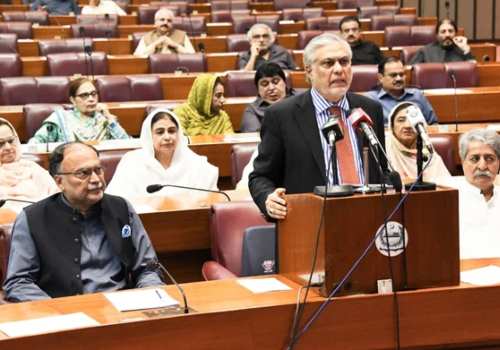ISLAMABAD: The National Assembly has granted majority approval for the federal budget of Rs. 14,480 billion for the upcoming fiscal year 2023-24. In a clause-by-clause examination, the finance bill has been endorsed, reflecting the government’s vision for economic growth and development.
Tax Collection Target Raised to Rs. 9,415 Billion, Pension Payments Increased
In a significant move, the tax collection target has been raised from Rs. 9,200 billion to Rs. 9,415 billion, demonstrating the government’s commitment to enhancing revenue generation. Additionally, pension payments have been increased from Rs. 761 billion to Rs. 801 billion, reflecting the government’s focus on the welfare of retired individuals.
Introduction of Rs. 215 Billion in New Taxes Under Finance Bill Amendments
Under the Finance Bill amendments, the government has introduced new taxes amounting to Rs. 215 billion. This strategic move aims to diversify revenue sources and strengthen the country’s fiscal position.
Revised Allocations Under NFC and BISP Programs, Federal Development Budget
Revised allocations have been announced for key programs and budgets. The National Finance Commission (NFC) will receive Rs. 5,390 billion, replacing the previous allocation of Rs. 5,276 billion. Moreover, the Benazir Income Support Program (BISP) will witness an increase to Rs. 466 billion from the previous Rs. 459 billion. The federal development budget has been set at Rs. 950 billion to foster progress and address critical infrastructure needs.
Amendment to Petroleum Development Levy Ordinance Approved
An amendment to the Petroleum Development Levy Ordinance has been presented by the Finance Minister and subsequently approved by the National Assembly. The amendment entails an increase in the petroleum development levy limit from Rs. 50 per liter to Rs. 60 per liter. This measure empowers the federal government to impose a levy of up to Rs. 60 per liter.
Amendment Permitting Use of 1200 cc Vehicles, Opposition Support
Opposition member Maulana Abdul Akbar Chitrali’s amendment, allowing the use of 1200 cc vehicles, has been accepted without opposition from the government. This amendment replaces the previous allowance of 1300 cc to 1600 cc vehicles.
National Assembly Rejects Referral of Finance Bill to Council of Islamic Ideology
In a majority vote, the National Assembly has opposed the motion to send the Finance Bill 2023 to the Council of Islamic Ideology for review. Despite Maulana Abdul Akbar Chitrali’s demand, supported by Jamaat-e-Islami, government and opposition members alike resisted seeking the council’s opinion due to the inclusion of interest. The bill will proceed without referral to the Council of Islamic Ideology.
Finance Bill Clause Three Approved with Amendments
Finance Minister Ishaq Dar’s clause in the Finance Bill has been approved with three amendments. The amendment establishes a three-member committee tasked with resolving disputes, including the resolution of 62,000 pending cases involving Rs. 3,200 billion. Notably, the Federal Board of Revenue (FBR) will be unable to file an appeal against the committee’s decisions, but aggrieved parties will retain the right to approach the court.
Additional Taxes on Fans and Bulbs Approved
Further amendments to the Finance Bill include the approval of additional taxes on fans and bulbs utilizing outdated technology. Effective from January 1, old technology fans will be taxed at Rs. 2,000, while old bulbs will be subjected to a 20 percent tax.
Government and Opposition Approve Total of Nine Amendments in Finance Bill 2023
The Finance Bill 2023 has seen a total of nine proposed amendments, out of which eight were approved by the government and one by the opposition. These amendments reflect efforts to fine-tune the bill and address various economic concerns in the country.
Property, fertilizers and juices
An amendment to increase the tax on property purchase and sale from 1 to 2 percent was approved. An amendment to impose 5% federal excise duty on fertilizers was approved, the federal excise duty imposed on juices was increased from 10% to 20%.
(Islamabad51-Newsdesk)














